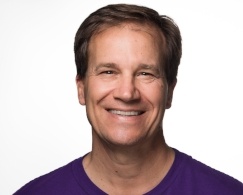.jpg?width=500&name=Doug%20Butler-3931%20(1).jpg)
4 min read
In our new CEO Corner, Reward Gateway's CEO Doug Butler will share his insight on issues that matter most in our mission to make the world a better place to work.
When I became CEO of Reward Gateway almost two years ago, the company’s Founder, Glenn Elliott, told me that in my new role I would need to “own the culture.” Of all my new responsibilities this was perhaps the most intimidating because at Reward Gateway our culture is so fundamental to who we are and what we do.
In addition to being intimidating, this advice was also incredibly ironic because based on culture-based recommendations made before I joined 'RG,' I was never supposed to be here.
When I was interviewing for my initial role at Reward Gateway as the CFO, the company used an outside consultant to assist in their assessment. After reviewing my resume, and meeting with me personally, this consultant recommended against hiring me, principally because they didn’t believe I was a “culture fit.”
To be fair at that time I might have agreed with them as my career was developed in traditionally corporate environments (including Barclays and GE). I had certainly never worked in a culture like Reward Gateway’s, which is people-centered, mission- and values-driven, stresses open and honest communications, and is centered on trust between leadership and the entire team.
.jpg?width=500&name=RG-GBU-36-2018-London_-62%20(1).jpg)
Fortunately for me, and I hope the business, this guidance was ignored by Glenn who not only saw something in me that did “fit,” but who also believed that healthy company cultures evolve and require, among other things, diversity of opinions and experiences.
Recently I was reminded of this (now funny) anecdote when approving the hiring of a new RG teammate who I knew would bring a new level of energy and a different kind of personality to the business. In the end I thought this new employee would be different, but actually a “culture add.”
The term “culture fit” carries obvious and dangerous implications around potential gender, racial, age, sexual orientation or other bias. I also believe it can create a barrier to transformation and change.
Selecting only individuals who 'fit' some preconceived notion of what a company’s culture is leaves little room for evolution, new thinking and innovation.
Aside from my own experience, I am inclined to believe that the term “culture fit” should be eliminated from hiring conversations. Our People Team stopped using the term several months ago, but it still sneaks in occasionally as I recently had a “culture fit” question posed to me on a hiring appraisal questionnaire provided by a 3rd party provider. I politely declined to answer that question.

I believe that finding culture adds, rather than boxing companies (and prospective candidates) into culture fits, is a superior goal for recruiters and hiring managers alike. I am not advocating the hiring of jerks or people with personalities and attitudes that would negatively disrupt a business or its culture. Rather, I believe that considering candidates whose experience and personalities are different than the rest of the team can positively impact the culture and, in turn, improve a business.
So I have learned that Glenn was right, the CEO and the rest of leadership need to own a company’s culture. We don’t dictate the culture, but we must pay close attention and be vigilant about eliminating potential negative influences, even seemingly innocuous ones like the term “culture fit.”
Working closely with your HR/People Teams is critical, and more often the challenge is about changing traditional thinking more than it is about not hiring or eliminating individual employees.
For my part, I like to tell people that Reward Gateway has changed me more than I have changed RG, but I also believe I have been able to positively influence the culture a little bit too. I might not have been a culture fit, but I hope I have been a culture add.
Stay tuned for the next CEO Corner on the importance of transparency in the workplace.

 Doug Butler
Doug Butler
